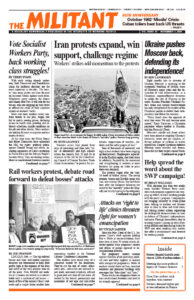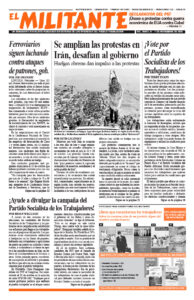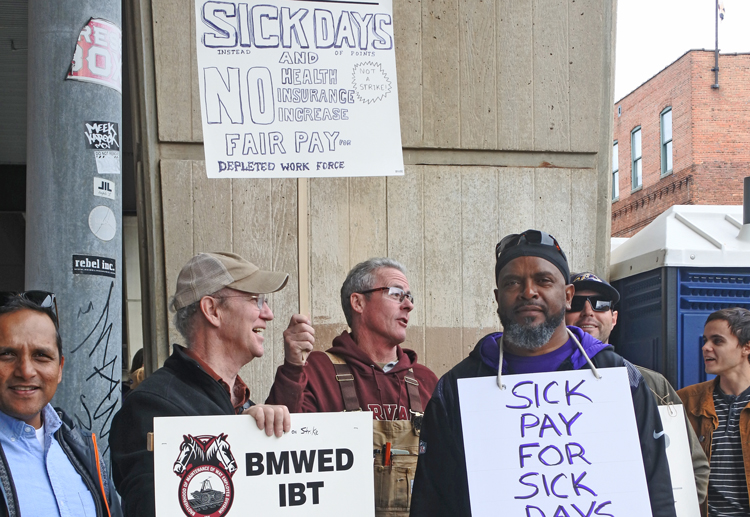LINCOLN, Neb. — The big railroad bosses and their well-heeled capitalist investors are determined to keep their profits high at the expense of the lives and safety of the very workers who do all the work. Over 100,000 rail workers in 12 unions are locked in a contract battle with a coalition of rail bosses — heads of five of the nation’s Class 1 railroads and a couple dozen smaller lines negotiating together as the National Carriers’ Conference Committee.
The workers have faced years of a concerted assault by the employers. They’ve cut the size of crews, eliminated jobs, contracted out railroad repair work, worsened schedules, refused to grant paid sick time off and more, all backed by the federal government and mountains of red tape and anti-strike provisions in its notorious anti-labor Railway Labor Act.
One of the three largest rail unions, the Brotherhood of Maintenance of Way Employees, with almost 24,000 members, rejected its proposed agreement Oct. 10. If any of the 12 unions decide to strike — on a deadline currently set for Nov. 19 — the entire national rail system will shut down.
The BMWE has been engaged in further negotiations since members voted the contract down. One of the biggest questions is the bosses’ refusal to grant them paid sick time to be able to seek medical help. The union’s proposal is for a modest seven days of paid sick leave a year. But the National Carriers’ Conference Committee unceremoniously rejected that proposal Oct. 19.
“It’s totally asinine,” Peter Kennedy, a BMWE national official, told CNN. “Members are very upset.”
Rail workers reach out for support
BMWE Lodge 0695 in Baltimore organized a picket at the M&T Bank Stadium there to distribute information on their fight for a contract to people going to the Oct. 23 Baltimore Ravens football game. Twenty workers came, including a couple from Philadelphia. One woman going to the game responded to a sign reading “Paid Sick Days” saying, “everyone deserves sick days, everyone!”
“Too long we have been laying back, letting other people do things for us. It’s time that working people do something. Nothing is going to change if we don’t,” William Woodring, a BMWE rail grinder machine operator at CSX in Baltimore and a 20-year railroader, told the Militant. “One problem is the precision schedule which basically means do more, with less, and charge more for it,” he said. “They laid off 45,000 workers in the last five years, tore up tracks and cut back on crews.”
Precision Scheduled Railroading is a profit-boosting scheme started by rail bosses to slash the number of workers of all crafts as a way to cut operating costs and boost profits. “We can’t take time off because there is no slack to make up for it. We get points if we’re sick. We don’t get sick days and we need them,” said Woodring.
The bosses insist they’re justified in refusing to meet workers’ demand for more paid sick time off. “Now is not the time to introduce new demands that rekindle the prospect of a railroad strike,” the National Carriers’ Conference Committee said in a statement Oct. 19.
“The carriers’ position is misleading beyond a doubt, these are not new demands,” Jake Forsgren, a track worker and welder in Nebraska and local chair of BMWE Lodge 1320, told this Militant worker-correspondent Oct. 22. “The union was able to secure one additional paid personal day in the tentative national agreement — the first increase in paid time off that we have secured since 1981. That is not enough.”
Thousands of BMWE members are sent hundreds of miles away from home laying and repairing trackage, and building and repairing bridges each year. In Baltimore, Woodring said, he was off to West Virginia for a week to repair track there.
In its recommended agreement, the Presidential Emergency Board, hand-picked by Joseph Biden under the Railway Labor Act, acknowledged the BMWE “provided scores of anecdotes of employees who were forced to sleep in cars, skip food or eat nothing but fast food, sleep in substandard hotels with bed bugs and criminal activities taking place on premises, or sleep multiple employees in a room even during the COVID pandemic.” But they didn’t recommend much relief.
Even some of the shipping bosses who use rail transport for their freight have called on the railroads to grant workers’ demands. They get short shrift from rail bosses as well, facing ever higher prices and often having their goods held up in transit due to the shortage of workers and rail boss disdain.
“Why are we in this predicament?” Eric R. Byer, president and CEO of the National Association of Chemical Distributors, wrote in an opinion column online in SupplyChainDive Oct. 17. “Because the freight rail companies put us here.” He also pointed to Precision Scheduled Railroading, saying it “has directly led to a dwindling number of rail workers that support our critical supply chain.”
Byer says that the proposed agreement “does not include any significant measures to improve quality of life issues. Rail workers today have zero time allotted to them by their rail employers for sick leave.
“Now is not the time,” he concludes, “to deny reasonable benefits for a labor community that has been decimated by losses in recent years.”
The fight continues
The two unions whose members operate the trains and organize the majority of rail workers — over 62,000 conductors and engineers — the Sheet Metal, Airline, Rail and Transportation Workers Transportation Division (SMART-TD) and the Brotherhood of Locomotive Engineers are expected to announce the results of their contract votes Nov. 17.
The rail bosses have refused to discuss key questions these workers face of crew size, attendance policies and safety in the recent negotiations. They continue to push to cut crews down — to one-person “crews” on the road. Many operations today in rail yards are already done by one worker alone, not even on the train but using a remote-control device on the ground.
Rail workers across the board are angry about the way their jobs have been transformed over years, from ones they were proud to work to ones where they find it almost impossible to work safely or get a regular schedule that allows time for family and friends, as well as union and political activity.
However the votes on the contracts turn out, railroad workers’ battles against the conditions imposed by the bosses and capitalist for-profit system will continue.
Joe Swanson is a retired rail worker and member of SMART-TD. Arrin Hawkins in Washington, D.C., and Chris Hoeppner in Philadelphia contributed to this article.


